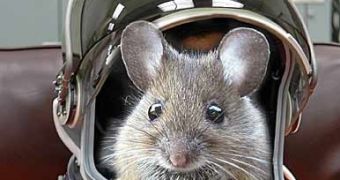Only yesterday, Russian officials went public with the news that a capsule carrying several mice, lizards, gerbils, newts and other animals had successfully been recovered following its being made to spend a total of 30 days in space.
While “exploring” space, the animals reached heights of 345 miles (555.2 kilometers) above our planet.
The specialists who worked on this project explain that, now that the animals have been returned to Earth, they plan on carrying out several investigations aimed at shedding new light on how outer space conditions impact on living organisms.
What these researchers are first and foremost interested in determining is how weightlessness has affected the animals' skeletons, their nervous systems and their muscles (especially their heart muscle), Daily Mail reports.
The same source informs us that the Bion-M that served as these animals’ home for about a month was retrieved after it had landed roughly 745 miles (1199 kilometers) southeast of Moscow, in the Orenburg Region.
By the looks of it, the lizards sent into outer space as part of this mission have been the ones the least affected by their trip. Thus, all of them have successfully made it back on Earth.
However, most of the mice and newts died while floating about in space, as did all of the gerbils.
Interestingly enough, this happened regardless of the fact that the capsule was designed to accommodate for these animals for a period of roughly six months, yet only ended up spending 30 days in space.
Since their being placed inside this capsule and up until present day, the animals have been subjected to over 70 tests by scientists.
Some of these tests took place while the animals were still in space, and others are being carried out just now in Moscow.
Information shared with the public says that Russia intends to roll out a manned mission to Mars, and that the data collected with the help of such experiments carried out on animals will allow them to better prepare their astronauts.

 14 DAY TRIAL //
14 DAY TRIAL //